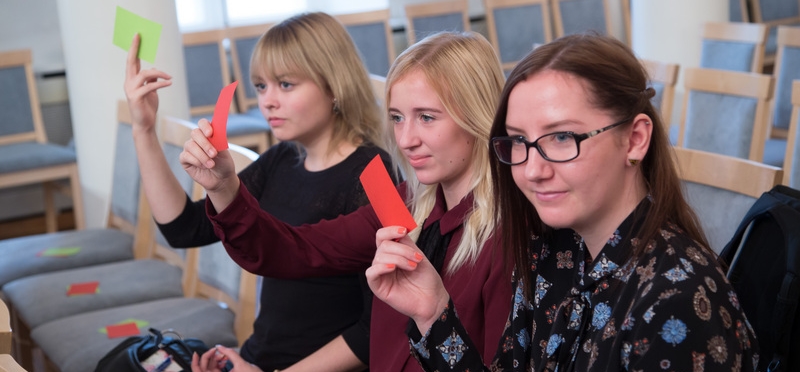- Home
- Study book
- Week 1: Introduction to multilingualism and plurilingualism
- Week 2: Understanding bilingualism
- Week 3: Multilingualism in state and society, and the role of communities
- Week 4: Early Childhood Multilingualism
- Week 5: Multilingual school
- Week 6: Multilingual higher education
- Week 7: Interculturalism and intercultural communication
- Course team

MOOC: Multilingual Education
Week 6 Pool of ideas for seminars, multilingualism and higher education
The readings, videos and activities below are designed to provide opportunities for deepening your knowledge about the topics covered in Week 6 of the MOOC (e-Course) “Multilingualism in Higher Education”. It is aimed to be used in academic seminars, providing extra materials, some suggestions for activities, etc.
In order to become familiar with the basics of the topic, it is recommended that you go through the self-study e-Course as follows:
- To become familiar with the topic and concepts of multilingualism and higher education, study the MOOC materials of Week 6 part 1 here: https://sisu.ut.ee/multilingual/book/2-multilingual-teaching-and-learning-higher-education-methods-and-practices
- … Week 6 part 2 here: https://sisu.ut.ee/multilingual/book/6_2_internationalization-domination-of-english
- … Week 6 part 3 here: https://sisu.ut.ee/multilingual/book/3-supporting-faculty-academic-skills-staff
- Complete the Week 6 quiz here: https://sisu.ut.ee/multilingual/multilingual-quiz-6
Extra materials for academic seminars or for individual learners to learn more deeply about the topic:
MAGICC tool – modularising Multilingual and Multicultural Academic Communication Competence for BA and MA level
Self-evaluation using the MAGICC tools:
Please see the video presentation of the project „Modularising Multilingual and Multicultural Academic Communication Competence for BA and MA level“ (MAGICC) and explore the tools on the project website.
- Which of the tools and why would you use at a multilingual and multicultural classroom as a university teacher?
- Get familiar with the MAGICC conceptual framework and analyse your intercultural skills and competences for academic and professional spoken interaction. To what extent could special attention to the development of intercultural skills and competences for academic and professional purposes be the sixth success factor of multilingual universities?
Good practices in Multilingual Education: Comparison of Multilingual Universities’ Models
Multilingualism in European higher education is closely connected with issues of quality and attractiveness of tertiary education in many European countries, especially in the countries and regions whose geographical locations and historical backgrounds have greatly shaped their multilingual and multicultural identities. Universities in such regions may be considered as effective examples of how multilingualism can be supported at the higher education level administratively, academically, socially, etc. Multilingualism is viewed broadly – it does not only imply the knowledge of a mother tongue and mastery of the English language but also the knowledge of languages of neighbouring countries and languages of ethnic minorities.
The article presents the trilingual educational model of Narva College of the University of Tartu (Estonia) in comparison with other European multilingual universities’ models (Switzerland, Finland, Italy, and Luxembourg) and to discuss nowadays tendencies in their development.
Raud, N. & Raik, K. (2014). In Search For Good Practices In Multilingual Education: Comparison Of Multilingual Universities’ Models. Sustainable Multilingualism, 4/2014, http://dx.doi.org/10.7220/2335-2027.4.6 (Fail also added below)
Internationalization in HE
Being internationally active is one of main characteristics of most successful higher education institutions. Yet, the phenomena also has its dark side, as it turns out. The following articles invite you to think about pros and contras of the internationalization in higher education.
– http://www.universityworldnews.com/article.php?story=20180220091648602
– http://www.universityworldnews.com/article.php?story=20170927101224475
– http://www.universityworldnews.com/article.php?story=20171010115112828
– Hans De Wit: https://ejournals.bc.edu/ojs/index.php/ihe/article/viewFile/8556/8321
Multilingualism in higher education
– Models of multilingual universities: http://www.charlesvanleeuwen.nl/docs/van-leeuwen-MULTILINGUAL%20UNIVERSITY-revised.PDF
– Hamburg Univ: https://www.nachhaltige.uni-hamburg.de/downloads/1_5projekte/posterbooklet-multilingualism.pdfRole of English: http://pure.au.dk/portal/files/70843663/Multi_cult_l_multilingual_HE_in_the_age_of_Anglophonization.pdf
– Mercator: https://www.mercator-research.eu/en/ and Mercator conference: https://langscape-conference.eu/fileadmin/mercator_conference/2017-10-12_-_LAngscape_Ljouwert/Programme___abstracts_Langscape_conference_2017.pdf
Globalization and Internationalization in Higher Education
Knight, Jane “Five Myths About Internationalization” https://ejournals.bc.edu/ojs/index.php/ihe/article/view/8532/7666
de Wit, Hans, ed. “Globalisation and Internationalisation of Higher Education” https://link.springer.com/content/pdf/10.7238%2Frusc.v8i2.1247.pdf
van der Walt, Christa “Reconsidering the role of language-in-education policies in multilingual higher education contexts” https://www.ajol.info/index.php/splp/article/view/15185
de Wit, Hans, Fiona Hunter, Laura Howard and Eva Egron-Polak “Internationalisation of Higher Education” http://www.europarl.europa.eu/RegData/etudes/STUD/2015/540370/IPOL_STU(2015)540370_EN.pdf
Multilingualism and plurilingualism from the pre-service teachers’ perspective/Večjezičnost in raznojezičnost z vidika bodočih pedagoških delavcev.
Read the article (in Slovenian) below on the way future teachers perceive the concepts of multilingualism and plurilingualism. Compare your own attitudes and beliefs on the different aspects of language diversity.
Reading: article by Žefran, M., Bratož, S., Pirih, A. Večjezičnost in raznojezičnost z vidika bodočih pedagoških delavcev. In: Rutar, Sonja (ed.), et al. Perspectives of internationalisation and quality in higher education. Koper: Založba Univerze na Primorskem. 2017, pp. 139-154. (article not available on-line)


